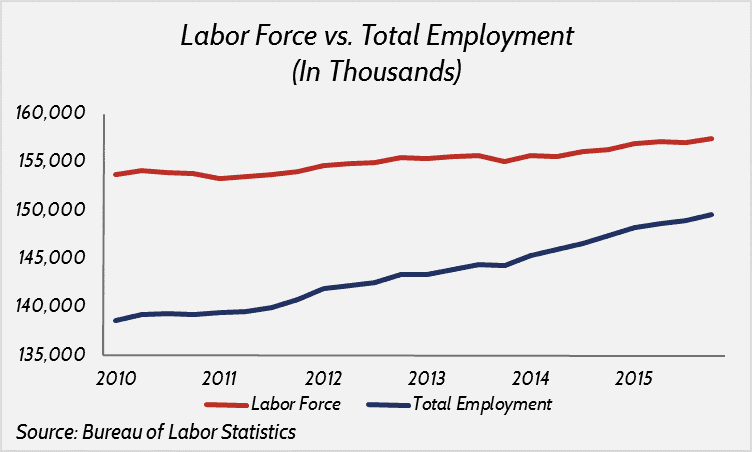Insight
February 8, 2016
New Study Suggests Refugee Entry Would Not Harm U.S. Job Market
The refugee crisis emanating from the Middle East into Europe and surrounding areas has garnered national and global media attention. The U.N. Refugee Agency reports that more people were displaced by war and persecution in 2014 than in any other year on record, in large part due to the Syrian Civil War. In the United States, refugee policy has the focus of many policymakers. President Obama gave a nod to the Syrian Refugee Crisis during his final State of the Union when he declared “we’re partnering with local forces and leading international efforts to help that broken society pursue lasting peace.” He made a bolder statement, however, by inviting a well-known Syrian Refugee to sit with the First Lady during his address.
This is a very contentious issue: political leaders on both sides have called for pausing, or even eliminating, the U.S. refugee resettlement program due to national security concerns. The House of Representatives showed overwhelming support for a new bill that would slow the entry of refugees by tightening security checks. Others argue that thousands of Syrian refugees pouring into the labor market would increase competition for jobs and negatively affect native U.S. workers.
Meanwhile, 13.5 million people in Syria are in need of humanitarian aid. Nations such as England and France are welcoming them with open arms. Germany, which accepted more refugees last year than the U.S. has in a decade, received over 100,000 Syrian asylum applications in 2015. And President Obama plans to accept 10,000 this year.
National security concerns are valid and difficult to address, but from a labor market perspective, would accepting Syrian refugees harm the U.S. economy?
Last December, the National Bureau of Economic Analysis (NBER) released a report examining the most recent large-scale refugee wave to the United States. This influx, coined the Mariel Boatlift of 1980, brought to Miami 125,000 migrants fleeing Cuba’s economic downturn. NBER analyzed the labor market impacts on Miami and 43 surrounding cities using a synthetic control method, where the actual effects were compared to a control group scenario. The control group simulated what labor market conditions would have been without the refugee wave.
NBER focused exclusively on high school dropouts, as more than half of the Cuban refugees did not hold high school degrees. Furthermore, the Boatlift generated a 15 to 18 percent increase in high school drop-outs, compared to a 3 to 6 percent increase in more educated workers.
Even with this boost in labor market competition, NBER found no significant difference in wages or unemployment between non-Cubans in Miami and non-Cubans in the control group.
NBER’s findings are not too surprising. The consensus from existing literature is that increasing the foreign-born population has little labor market impact on the native-born. If anything, it has shown to produce positive economic benefits for native workers on average. Any negative effects tend to be small, concentrated within less-educated workers, and only in the short-run. A 2006 NBER study found that increased immigration levels in the U.S. from 1990 to 2004 had largely positive impacts on native wages. The only individuals hurt by the labor force competition were previous immigrants: those who had come to the U.S. earlier and were in direct competition with the new immigrant workers.
Immigration critics argue that raising the supply of workers increases competition for jobs. That may be true to an extent, but the number of jobs in our economy is not fixed. The chart below demonstrates that neither jobs nor the labor force is static; as the supply of workers grows, total employment grows along with it.
Evidence suggests that an influx of Syrian migrants would not harm U.S. workers. The movement of refugees has actually benefited Syria’s neighboring economies, boosting labor, demand, and output in countries like Turkey and Lebanon. While security is still an important consideration, the possible economic benefits should not be overlooked.











